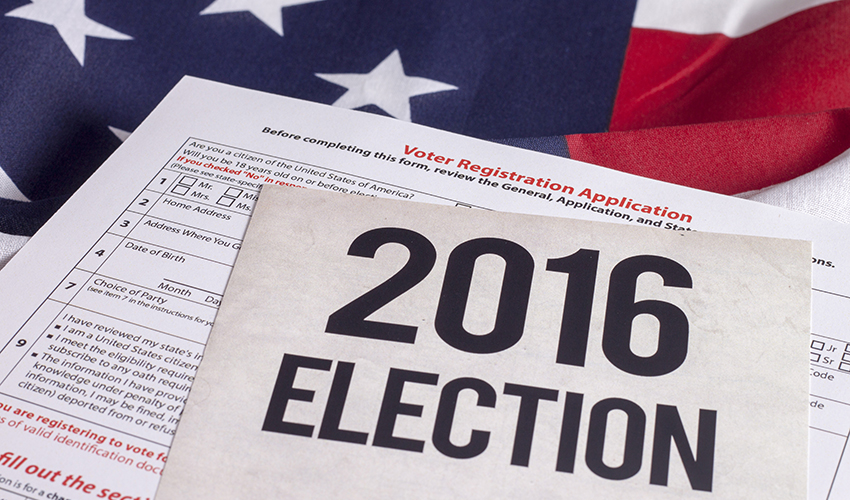SF State experts weigh in on the state of the 2016 presidential race

SF State political scientists weighed in on issues surrounding the state of the 2016 presidential race.
Political strategists have referred to the March 15 primaries — Florida, Illinois, Missouri, North Carolina and Ohio — as "Super Duper Tuesday," with the events leading up to these contests and the subsequent results being critical to the 2016 presidential race.
According to strategist Peter Fenn, one could argue that "the winner-take-all primaries of Florida and Ohio are now looming as critical to any effort to stop Donald Trump." What are the odds of that happening?
Several San Francisco State University political scientists weighed in on this and other questions surrounding the state of the 2016 presidential race. They include:
- Assistant Professor Marcela García-Castañon, whose expertise includes American and Latino politics, immigration policy and political communication
- Assistant Professor Justin Peck, who focuses on Congress, the presidency and the national security state
- Professor Robert C. Smith, who is an expert on African-American politics and the relationship between conservatism and racism in the U.S.
Realistically, is the race for the Republican nomination already decided?
Peck: Donald Trump can still be stopped. If he fails to win a majority of delegates before the GOP convention in July, there is no guarantee that he will leave Cleveland with the nomination. Trump faces significant opposition from elected GOP officials and he has run much closer to Cruz in 'closed' primaries in which only Republicans can vote. This suggests that he could be denied the nomination. It would be truly historic for the Republicans to deny the nomination to the candidate who comes into the convention with more delegates than anybody else. At this point, all signs point toward Trump being the nominee.
How will Latino voters shape the race, particularly with the various stands taken by the candidates on immigration issues?
García-Castañon: The unceasing hostility by the GOP and their failure at recognizing the diversity and contributions of the Latino community will alienate Latino voters for this election and many more to come. Latinos have shown that they don't take threats and insinuations about their [lack of] worth lightly, and they register and turn out to vote as a result. In states where the Latino electorate has wielded electoral power, like California, Texas or Florida, their influence has been clear — often in favor of Democratic candidates. Newer states with more recent Latino population spikes, like Colorado, Georgia or North Carolina, will replicate these Latino preferences across the nation and show that this is not a demographic to be ignored, targeted or scapegoated.
Does Bernie Sanders have a realistic shot at winning enough delegates to beat Hillary Clinton for the nomination? If not, what has his presence done to the Democratic race and, specifically, to Hillary Clinton's campaign strategy and stance on the issues?
García-Castañon: Sanders is inching closer and closer to Clinton, but this may not be enough to overtake her lead in delegates. Clinton's dominance in securing super delegates demonstrates party coalition behind Clinton, but Sanders' presence is challenging that control. His presence is shifting her further to the left on policies and bringing up issues that Clinton would rather not discuss, like Wall Street funding and unfavorable policy positions she has taken. So far, Clinton is on target to secure the nomination by June, but Sanders' recent upset in Michigan shakes up the expectations that Clinton will win in states dominated by racial minority voters.
If Trump wins the 1,237 delegates needed for the nomination, could the GOP stop him during the convention? What would that look like?
Smith: The delegates are legally bound on the first ballot, so if Trump wins 1,237 delegates he cannot be legally stopped. Any attempt to do so will result in a Trump walk-out and the disintegration of the party on
national television.
What down-ballot effects can we expect with a Trump nomination?
Peck: This is the most important question of the 2016 election cycle. More Republicans than Democrats have turned out to participate in primaries and caucuses. If this trend holds, Trump could also motivate supporters to vote for down-ballot Republicans. That would be good news for the GOP. On the other hand, a Trump candidacy might motivate significant turnout from Democrats who fear a Trump presidency and a GOP congress. More Senate Republicans than Democrats are up for reelection this year and Majority Leader Mitch McConnell has publicly expressed his fear that Trump will cost Republicans the Senate. I lean toward Senator McConnell's perspective on this question but I don't think anybody can be sure.
Professor Smith, your book "Polarization and the Presidency: From FDR to Barack Obama" explores the role of presidents and presidential candidates in polarizing American politics. Assuming the two front-runners, Hillary Clinton and Donald Trump, win the nomination for their parties and one wins the presidency, what level of polarization do you foresee?
Smith: The degree of racial, ideological and partisan polarization is at historically high levels, so high that it is not likely to be fundamentally changed by the outcome of the 2016 election. Trump is not an ideological conservative as are Cruz and Rubio, so it is possible that a Trump presidency over time could become less polarizing. But if he pursued conservative policies then there is little chance the level of polarization will be affected. Polarization is about real differences between the parties on the purposes and roles of government in U.S. society, and there is little the candidates can do to change this basic source of the polarized polity.
•••
In a presidential race in which it's anyone's guess what will happen from one day to the next, "The success of Trump is without precedent in U.S. presidential elections, and political scientists are at a loss to explain or predict," Smith said. "One thing we can predict: A lot of dissertations will be written to attempt to understand what happened and why."